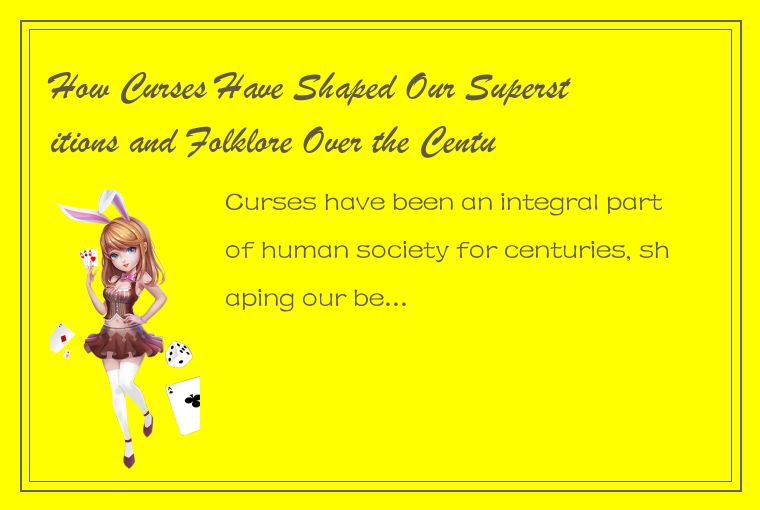Curses have been an integral part of human society for centuries, shaping our beliefs, superstitions, and folklore. From maledictions to hexes, from the evil eye to voodoo dolls, curses have always fascinated us, inspiring countless myths and legends.

The Origins of Curses
The origins of curses are shrouded in mystery, but it’s safe to say that they have been around since the dawn of humanity. In ancient times, people believed that curses were sent by the gods as punishment for wrongdoing, and that they could bring about misfortunes, sickness, and death. Many cultures still hold similar beliefs today, and curse words are still used to vent anger and frustration.
As societies evolved and became more complex, curses took on new forms and meanings. They became tools of revenge, used to inflict harm on enemies and rivals. They also became a way of protecting oneself from harm, by warding off evil spirits and maleficent powers.
Curses in Folklore and Mythology
Throughout history, curses have played a prominent role in the mythology and folklore of many cultures. In ancient Greece, curses were often used as a plot device in tragedies, as they could bring about the downfall of heroes and villains alike. The myth of King Midas, for example, features a curse that turns everything he touches into gold, ultimately leading to his ruin.
In Egyptian mythology, curses were believed to be especially powerful, as the gods themselves could inflict them on mortals. The curse of the mummy, for instance, was said to be a punishment for those who disturbed the tombs of the pharaohs. According to legend, the curse could bring about plagues, disasters, and even death.
In Hindu mythology, curses play a central role in many of the stories and legends. The Ramayana, for example, features a curse that sets in motion a chain of events leading to the epic war between Rama and Ravana. The curse of the sage Durvasa, which falls upon King Ambarisha, is another famous example.
Curses in Superstitions and Folk Beliefs
Curses have also shaped many of the superstitions and folk beliefs that are still prevalent today. In many cultures, it is believed that curses can be placed on people by simply looking at them with envy or malice. This is known as the evil eye, and it is said to bring about bad luck, illness, and even death. To ward off the evil eye, people often wear talismans or amulets, or perform rituals and prayers.
Another common superstition is the curse of the werewolf. In many European cultures, it was believed that people could be transformed into wolves by being cursed, or by drinking the blood of a wolf. The curse was said to be spread by the bite of a werewolf, and it could only be lifted by finding and killing the source of the curse.
Curses in Witchcraft and Voodoo
Curses also play a prominent role in the practices of witchcraft and voodoo. In these traditions, curses are used to harm enemies or to protect oneself from harm. They can take many forms, from simple spells and incantations to complex rituals and ceremonies.
In voodoo, curses are believed to be especially powerful, as they can be directed at specific individuals or groups. The practice of making voodoo dolls is a common way of cursing someone, as it is believed that the dolls can be used to inflict harm on the person they represent.
The Consequences of Curses
Whatever their form or origin, curses have had a profound impact on human culture and society. They have inspired countless stories, myths, and legends, and have shaped many of our beliefs and superstitions. However, curses can also have serious consequences for those who believe in them.
Believing in curses can lead to fear, anxiety, and paranoia, and can cause people to act in irrational ways. It can also lead to violence and conflict, as people seek revenge or protection from perceived curses. Ultimately, it is important to remember that curses are nothing more than superstitions and beliefs, and that they have no real power over our lives.
Conclusion
Curses have shaped our superstitions and folklore over the centuries, from ancient myths and legends to modern-day beliefs and practices. While they can be fascinating and intriguing, it is important to approach them with caution and skepticism. By understanding the origins and consequences of curses, we can gain a deeper appreciation of the rich and complex cultural traditions that have shaped our world.




 QQ客服专员
QQ客服专员 电话客服专员
电话客服专员